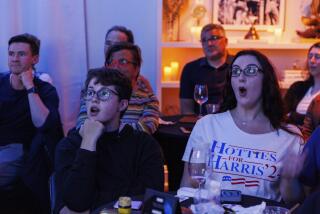French Voters Watch Candidates’ TV Clash : Politics: Conservative Chirac and Socialist Jospin are polite but pointed in 2-hour presidential debate.
PARIS — With more than 30 million voters watching, presidential candidates Jacques Chirac and Lionel Jospin vigorously but politely battled for more than two hours Tuesday night, clashing on everything from a cure for unemployment to automatic citizenship for French-born foreigners.
The nationally televised debate, just five days before Sunday’s French presidential election, marked the only face-to-face encounter of the campaign between the conservative Chirac and the Socialist Jospin, each of whom is trying to win converts among still-undecided voters.
Neither Chirac, who held a 10-point lead in the last polls, nor Jospin scored a clear victory in the 135-minute debate.
But French analysts immediately praised the candidates for focusing on serious issues facing this country and avoiding the temptation to launch the type of personal attacks that have characterized much of the four-month campaign.
“This debate has brought back the honor in French political life,” said Dominique Gerbaud, editor of La Nouvelle Republique, a daily newspaper in Tours, southwest of Paris.
During the debate, Chirac, 62, stressed his long experience in government, including four years as prime minister during two stints and 18 years as mayor of Paris. The candidate, who had been criticized by some for being overly combative and a poor performer on television, appeared relaxed, smiling and laughing often.
Jospin, a 57-year-old former education minister, also used his confident performance in the debate to help erase his image as someone too inexperienced to be president of France.
The little-known Socialist confounded polls when he emerged atop the nine-candidate field in preliminary voting last week.
The two men are battling to replace retiring President Francois Mitterrand, a Socialist who has been in office for 14 years. And the debate, predictably, cast the candidates clearly as representatives of opposing ideologies.
Chirac argued for incentives to small entrepreneurs to create more jobs in France, which has been battling an unemployment rate of 12.3%, the highest in northern Europe.
“We have to give a little oxygen to those who innovate, those who invest and those who work” as a way to solve the jobless problem, he said.
Jospin countered with proposals to reduce the workweek, halt privatization of public enterprises and launch large social welfare projects sponsored by the state.
Chirac may have influenced some voters by raising the specter of another Socialist president battling a conservative-controlled National Assembly. Chirac has said he would not call new elections in the assembly, where conservatives already control 80% of the seats.
To rule effectively, Jospin would have to dissolve the assembly, as he has promised to do. But Chirac cast doubt on the Socialists’ ability to regain control of France’s lawmaking body.
The most theatrical moment in the debate came when Chirac challenged Jospin’s belief in an “impartial state,” saying he had figures proving that the Socialists had used their years in power to reward political cohorts with jobs in government and public companies.
Jospin called Chirac’s bluff, saying: “It’s not enough to say you have the figures, you must give them.”
With that, Chirac, reading from a paper, said Jospin during his short tenure as education minister in the 1980s dismissed 27 of 28 university rectors and six of nine department heads in the ministry, replacing them with party supporters.
Jospin called the figures “pure fantasy.”
“I’m sure that tomorrow, journalists will have examined these figures and verify that they are correct,” Chirac countered.
On foreign affairs, both candidates said they would favor the withdrawal of French troops from U.N. peacekeeping forces in Bosnia-Herzegovina if hopes for peace there dissolve. And Jospin said the French government had made a mistake in following U.S. policy supporting Russian President Boris N. Yeltsin’s crackdown in the breakaway region of Chechnya.
The two disagreed on immigration policy, the main plank of the right-wing National Front, whose candidate, Jean-Marie Le Pen, collected 15% of the vote in the first presidential round. Le Pen, who wants all immigrants ejected from the country, has said the choice between Chirac and Jospin is “detestable” and left his supporters free to vote for whomever they want.
Jospin argued against anti-immigrant laws enacted by the current conservative assembly, especially a new rule that removed the automatic citizenship once afforded foreigners born in France.
Chirac said he would support the current slate of immigration laws, which require foreigners born in the country to apply for citizenship when they reach their late teens.
Both candidates condemned the drowning Monday of a Moroccan man, who police said was thrown into the Seine by skinheads during a march led by right-wing leader Le Pen.
Jospin said the incident “injures the conscience of the French.” Chirac said he was “horrified.”
Earlier Tuesday, politicians from across the spectrum blamed the incident on the National Front’s anti-immigrant rhetoric. For his part, Le Pen claimed that his party was the victim of a “witch hunt” by opponents trying to discredit it.
More to Read
Sign up for Essential California
The most important California stories and recommendations in your inbox every morning.
You may occasionally receive promotional content from the Los Angeles Times.











